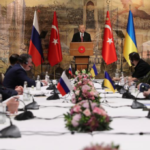Saudi Arabia has announced a halt to all military operations in Yemen, with the aim of reaching a permanent solution to the conflict in the neighboring country, the spokesman for the Riyadh-led coalition announced on Tuesday evening.
Yemen’s Houthi rebels had offered a three-day armistice earlier, which they said could be permanent if the Saudis agreed.
Read also; Azman Air suspends flights to Kaduna over airport attack
The spokesman for the Saudi-led coalition backing the Yemeni government against the Huthi rebels in Yemen’s conflict confirmed the ceasefire on Tuesday.
“The Joint Forces Command of the Coalition hereby announces cessation of military operations in Yemen beginning at (0600) Wednesday, March 30 2022,” the coalition spokesman, Brigadier General Turki Al-Maliki, announced just before midnight.
Al-Maliki said this was done at the request of Dr. Nayef Al-Hajraf, the secretary general of the Gulf Cooperation Council (GCC), “with the view of creating propitious conditions needed for successful consultations and a favorable environment for the Holy Month of Ramadan to make peace, and achieve security and stability in Yemen.”
The coalition will “abide by this cessation, and undertake all necessary steps and procedures to ensure its success,” the general added.
Al-Maliki’s announcement comes three days after the Houthi rebels in control of the Yemeni capital offered a three-day truce they said could become permanent if the Saudi-led coalition was willing.
“This is a sincere invitation and practical steps to rebuild trust and take all the sides from the arena of talks to the arena of acts,” the Houthis’ Supreme Political Council president, Mahdi al-Mashat Mashat, said on Saturday in a speech broadcast on Yemeni television. The Houthis would stop their missile and drone strikes and expect the Saudis to halt their bombing campaign and unblock Yemeni ports, Mashat said.
In the ceasefire announcement, Al-Maliki pointed out that the Saudi-led coalition “reaffirms its steadfast position in supporting the legitimate government of Yemen in both its political positions and military procedures and measures,” referring to the Riyadh-backed rival of the Houthis. So while it is possible that the Ramadan truce can become permanent, the dispute underlying the seven-year conflict remains unresolved. Ramadan is to start in the first days of April.
Saudi Press Agency reports that the truce announcement “coincides with the launch of Yemeni-Yemeni consultations with the aim of creating the appropriate conditions for their success and creating a positive environment during the holy month of Ramadan for peace making in Yemen.”
The rebels have shunned the meeting in Riyadh from Wednesday that is hosted by the Gulf Cooperation Council and involves the Yemeni government and US and UN envoys to Yemen. The Huthis say they won’t travel to enemy territory for talks.
UN envoy Hans Grundberg earlier on Tuesday evening said on Twitter: “I’m very grateful for the unanimous support expressed for UN efforts on immediate de-escalation and a political settlement of the conflict.”
Riyadh and its allies launched an air war in Yemen in March 2015, followed up by a ground campaign later, seeking to restore the Saudi-backed president, Abdrabbuh Mansur Hadi, who had been ousted by the Houthis. The coalition has accused the Shia group of being proxies of Iran, which Tehran has denied.
Nnamdi Maduakor is a Writer, Investor and Entrepreneur






















































